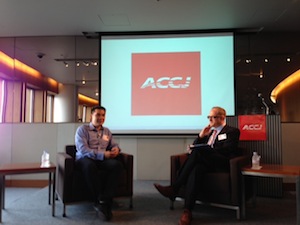[:en]
Today I interviewed James Chen for the American Chamber of Commerce in Japan at the Roppongi Hills Club. James is an American entrepreneur whose company was acquired by Rakuten Ichiba in 2009. James is now an executive officer of Rakuten in Japan, working directly under Rakuten CEO and founder, Hiroshi Mikitani.
I asked James about his views on entrepreneurship in Japan both during lunch and during the interview, and James had some interesting things to say. James feels that in theory, the Japanese can have ideas that are just as good as their counterparts overseas, but there is simply the lack of support to test and develop them. James feels there are two things are missing for Japanese entrepreneurs, particularly for tech entrepreneurs like himself: sources of funding and a peer community.
The lack of sources for venture funding is well-known in Japan, but one of the effects, James said, is that it tends to make young tech entrepreneurs naïve about what constitutes a compelling business model with serious revenue potential. You see, if you have a distinct lack of feedback from venture funders, the compelling propositions are on par with the non-compelling ones. They receive identical lack of attention. The lack of entrepreneurial peers has a similar effect. According James, in silicon valley, groups of peers listen to each others ideas, and are blunt and candid with feedback on how compelling an idea may be, and peers listen to each other. So Japanese entrepreneurs cling to futile ideas longer than their U.S. counterparts. There is a crucible missing in Japan.
James wants to change that. He is actively seeking to be a part of communities of entrepreneurs in Japan and insert that culture of blunt peer feedback. We all need candid feedback, even negative feedback, to grow stronger and better. At times it is indifference to our ideas that keeps them weak.[:ja]
つい先日、六本木ヒルズクラブで、日本アメリカ商工会を代表して、ジェームス・チェン氏をインタビューする機会に恵まれました。ジェームスは、2009年に楽天市場に当時運営していた会社を売ったアメリカ人起業家です。今では彼は日本の楽天の幹部のひとりとして楽天の経営者、創始者である三木谷浩史氏のすぐ下で働いています。
ランチ中、そしてインタビュー中にも、彼の日本人の起業家精神について訪ねてみたのですが、彼の答えはなかなか興味深いものでした。まず、日本人は、理論上は海外の起業家と張り合えるアイディアが出せるのに、そのアイディアを試して開発するためのサポートが受けられていないということ。具体的には、特に彼のような技術関連の起業家にとっては2つのものが欠けていると彼は感じています。そのひとつは資金源、そしてもうひとつは起業家達のコミュニティです。
日本ではベンチャー資金を集める為のリソースが大変少ないというのは良く知られていることですが、そのせいで、若いテクノロジー起業家達は、かなりの収入をもたらす可能性のある魅力的なビジネスモデルを作り上げるのに何が必要なのか、それをしっかり認識できないようになってしまうきらいがある、とジェームスは語りました。もしベンチャーの投資家からのフィードバックがひどく欠けている状態では、魅力的な提案も、全然魅力的でないものと変わりないことになります。どちらも気に留めてもらえないわけです。起業家仲間がいない、という状況も、同様な問題を生みだします。ジェームスによると、シリコンバレーでは、起業家達のグループはお互いのアイディアに耳を傾け、そこで出されるアイディアにどれだけ魅力があるか、率直な意見を交換し、言われた方もその意見を真剣に受け止めるのだそうです。結果、日本の起業家達は役にもたたないようなアイディアに、アメリカ人起業家に比べてずっと長い間しがみついているということになります。日本では起業家同士のサポートが欠けているからです。
ジェームスはこの状況を変えたいと考えています。彼は今、積極的に日本の起業家達のコミュニティーを探し、この起業家仲間の間での率直なフィードバックの大切さをわかってもらおうと頑張っています。我々は誰でも、強くよりよく成長する為には、まわりから正直なフィードバックを貰うことを必要としています。それが例え否定的な意見であってもです。我々は自分のアイディアに無関心でいることで、強さを失っていることがあることを、覚えておきたいものです。[:]

